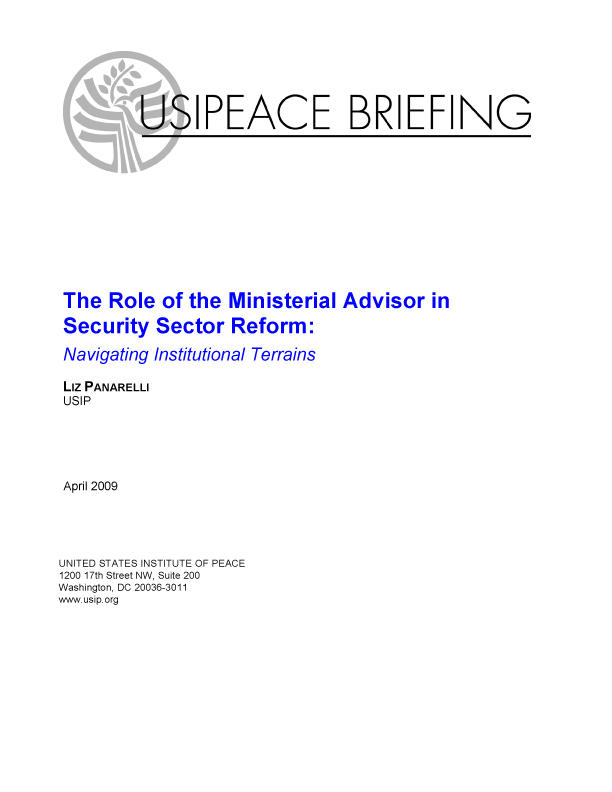The Role of the Ministerial Advisor in Security Sector Reform: Navigating Institutional Terrains
International actors in Security Sector Reform (SSR) are increasingly taking on roles as “advisors” to Ministries of Interior, Defense, and Justice. Rather than directly implement changes necessary for SSR, these advisors must persuasively articulate suggestions to their local counterparts. Advisors’ success depends on their ability to convey recommendations in a manner that makes change acceptable to their advisees.

Introduction
International actors in Security Sector Reform (SSR) are increasingly taking on roles as “advisors” to Ministries of Interior, Defense, and Justice. Rather than directly implement changes necessary for SSR, these advisors must persuasively articulate suggestions to their local counterparts. Advisors’ success depends on their ability to convey recommendations in a manner that makes change acceptable to their advisees. Ministerial and governmental advising is not the exclusive purview of any one entity. Rather, advising is undertaken by a diverse range of individuals from U.S. and foreign governments, militaries, NGOs, private contractors, and U.N. agencies. These actors have correspondingly diverse objectives and approaches to SSR; without coordination or consensus on SSR programming, advisors may find themselves working at cross-purposes. Furthermore, the multiplicity of advisors and institutions makes sharing best practices and improving over time and across conflicts extremely difficult.
What common challenges do foreign advisors face, and how might they pool intellectual resources and “lessons learned” to address these challenges? This question was addressed by a panel of distinguished experts at a recent meeting sponsored by the Institute’s Security Sector Reform Working Group. Principal speakers included:
- Michael Metrinko, Ministry Reform Advisor, U.S. Army Peacekeeping and Stability Operations Institute;
- Col. Christopher Tone, Senior Advisor to Afghan Defense Ministry, U.S. Army, 2007-2008;
- Col. David Dornblaser, Security Assistance Officer - Iraq, U.S. Army, 2006-2007;
- Julie Werbel, Senior Security Sector Reform Advisor, U.S. Agency for International Development;
- Lawrence Cooley, Founder and President, Management Systems International; and
- Nadia Gerspacher, Advisor, Education and Training Center, U.S. Institute of Peace.
Robert Perito, director of the SSR Working Group and a senior program officer at USIP, moderated the panel. The following is a summary of views expressed during the meeting.
About the Author
This USIPeace Briefing was written by Liz Panarelli, a Program Assistant in the Center for Post-Conflict Peace and Stability Operations at the United States Institute of Peace. The views expressed here are not necessarily those of USIP, which does not advocate specific policies.
The United States Institute of Peace is an independent, nonpartisan institution established and funded by Congress. Its goals are to help prevent and resolve violent international conflicts, promote post-conflict stability and development, and increase conflict management capacity, tools, and intellectual capital worldwide. The Institute does this by empowering others with knowledge, skills, and resources, as well as by directly engaging in peacebuilding efforts around the globe.



